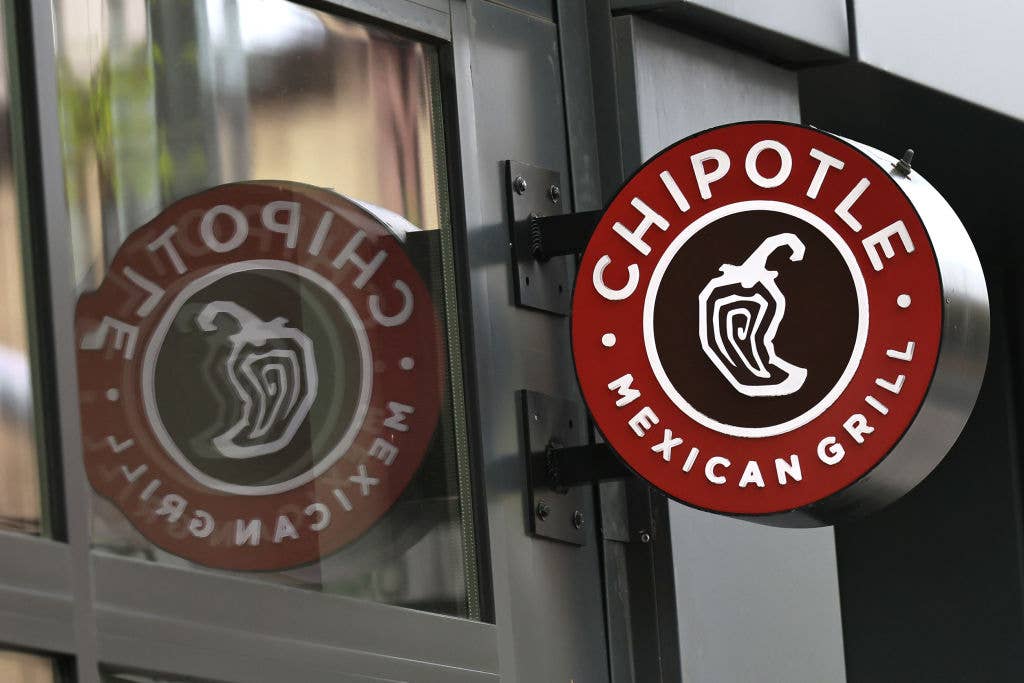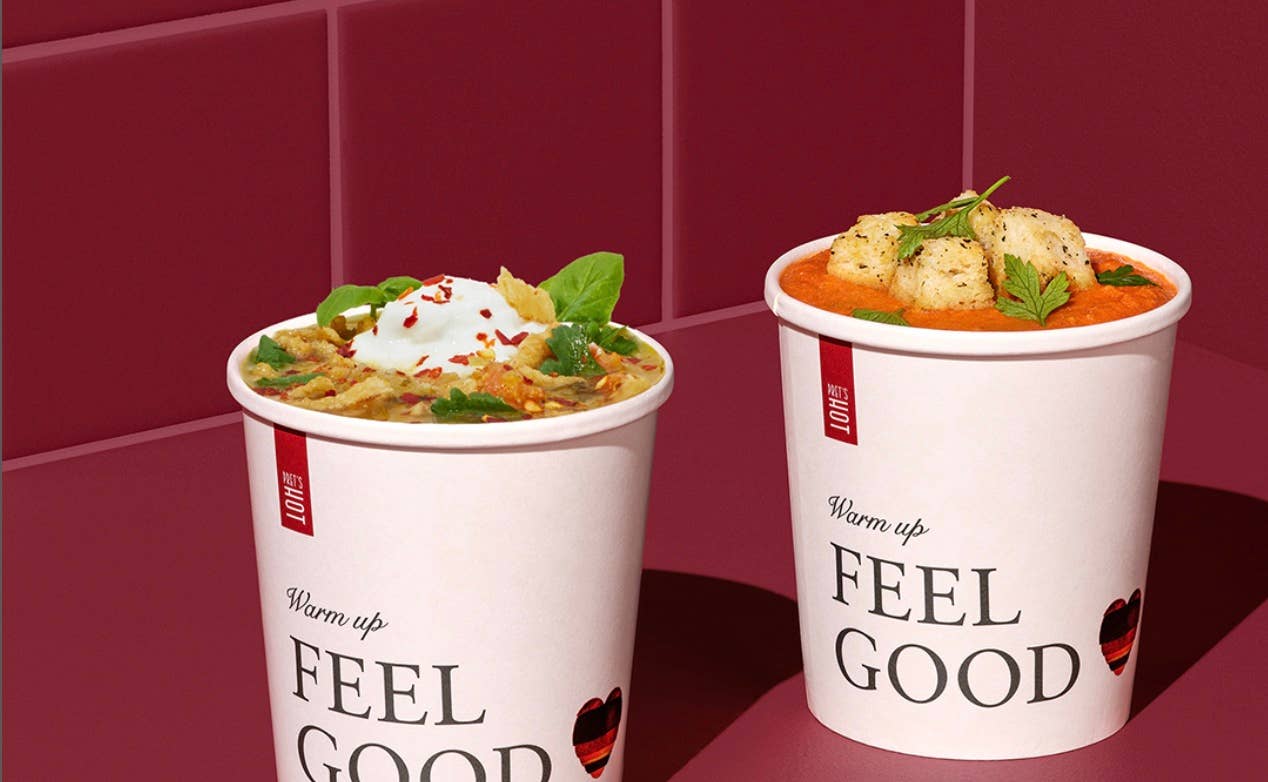
Everything That’s Vegan at Chipotle, Including What’s Not on the Menu
Chipotle has made a comeback from its previous troubles by focusing on healthy, fresh, plant-based ingredients that are ready to eat whenever you are. This chain is the top choice quick-service restaurant for plant-based and vegan consumers nationwide. With 2,500 locations across the United States, Chipotle is an easily accessible option for anyone who wants to avoid animal products and still have a delicious Mexican meal. Basically, any options for the meat-eating customer is available for plant-based consumer, just hold the meat and add beans, peppers, or whatever you want.
Whether you're ordering a burrito, tacos, a salad, or a burrito bowl, the restaurant offers enough vegan options to create a delicious and filling wrap. Chipotle only uses 53 ingredients totally in all its food, 44 of them being vegan. This makes it unbelievably easy to leave Chipotle with a satisfying, plant-based meal, plus, meat-free orders usually come with free guac and ring in at a far lower price!
Chipotle’s immense range of vegan options makes this an absolute favorite for any plant-based eater. The company caters so heavily towards plant-forward meals that you do not even need to be vegan to enjoy a completely plant-based meal. The only nine ingredients to watch out for when ordering include Monterey Jack cheese, beef, cheese cultures, honey, milk, pork, white cheddar, cultured cream, and chicken. Aside from those, the meal you walk out with is guaranteed to be vegan.
Meals
Burrito: The Chiptole Burrito is the heaviest and the greatest option on the menu. The soft, warmed flour tortilla can be filled with any number of ingredients, making it one of the most filling quick-vegan meals on the market. One of the greatest things about Chipotle is that it serves tofu sofritas, setting the company above its competitors. The restaurant chain offers black beans alongside tofu as a protein substitute, but Chipotle is the only quick-service Mexican-inspired restaurant to provide customers with tofu sofritas for their burritos. From guacamole to cilantro rice, the Chipotle burrito holds all the flavor you can ask for and more.
Tacos: The three taco meal is the less conventional option at Chipotle, but it hits all the marks necessary to leave more than satisfied. The tacos come packed into soft flour tortillas or crispy corn taco shells. You can customize your tacos to include any of the vegan fillings. The best part is that the three tacos do not need to hold the same contents, making customization a key drawing factor for the three taco meals. Our suggestion is to take one taco for tofu, one for black beans, and one for pinto beans, and then topped to preference.
Burrito Bowls: The only meal more filling than the burrito is Chipotle’s burrito bowl. Even though this option nixes the tortilla, it's possible to make two full meals out of the burrito bowl. Typically served with a rice base, you can order any of the vegan ingredients to cover the burrito bowl. The lower-carb option is definitely for those who want to either save leftovers easier or would rather sit down and eat unrushed with a fork.
Pro Tip: Order a tortilla (or two) on the side to get even more mileage out of your bowl.
Salads: For the healthiest option, Chipotle’s salads are a perfect choice. The salad comes served on romaine lettuce thatcher than the burrito bowl’s rice base. The salad is an easy, healthy, low-carb option that will still give any customer the full Chipotle experience. You can order any of the normal ingredients on top of your salad, including the sofritas tofu and fajita veggies to get the full burrito experience without as much of the heaviness. Chipotle also introduced a “Supergreens Lettuce Blend” in 2020 that contains kale and baby spinach to enhance the nutritional value of the salad. The nutrient-rich blend can be requested to replace the romaine lettuce on any salad order, giving even more diversity to the Chipotle menu. Take note that Chipotle's vinegarette contains honey, so opt for the hot sauce instead if you're vegan.
Complete List of Vegan Ingredients at Chipotle
- Black Beans
- Pinto Beans
- Cilantro Lime White Rice
- Brown Rice
- Fajita Vegetables (Bell Peppers and Onion)
- Guacamole
- Tortilla Chips
- Tofu Sofritas (Tofu with chipotle and poblano peppers)
- Romaine Lettuce
- Supergreen Lettuce Blend
- Green Chili Salsa
- Fresh Tomato Salsa
- Tomatillo Red Salsa
- Roasted Chili-Corn Salsa
Top Ingredients at Chipotle
Fajita Veggies and Black Beans: If you aren't a fan of tofu, the best burrito or burrito bowl base is the black beans and the fajita vegetables. The mix of carmelized red onions and assorted bell peppers make for a delicious, nutrient-filled addition to any meal. Seasoned with oregano, it adds a sweet and savory twist to the mixture of burrito ingredients. When accompanied with the black beans, the meal itself becomes packed with protein.
The Beet's Top Pick to Order
To make the Chipotle visit as easy as possible here is the quickest and most-filling menu option. The burrito bowl is the crown jewel of Chipotle, offering the perfect mixture of quality and quantity. Here is a quick guide to building the perfect burrito bowl:
Cilantro Lime Rice, Black Beans, Tofu Sofritas, Romaine Lettuce, Guacamole, Roasted Chili-Corn Salsa, Fajita Veggies, with a tortilla on the side. Make sure to get a side of tortilla chips to eat with.
The Top 20 Veggies with the Most Protein
1. Soy Beans
Soybeans are a legume but they are such a great source of protein that we had to lead the veggie list with it. There is more protein in just one ounce of soybeans than a cup of sliced avocado! 1 cup equals Protein - 28.6g Calories - 298 Carbs - 17.1g Fiber - 10.3g Calcium - 175mg
2. Peas
If the pod, that peas are grown in, is split down the middle, that is an indicator they are ripe. Seeds inside the pod vary and can be green, white or yellow. 1 cup equals Protein - 8.6g Calories - 134 Carbs - 25g Fiber - 8.8g Calcium - 43.2 mg
3. Corn
Fresh corn is a great source of energy for those who like to stay active. Protein isn't all that corn has to offer. Corn provides the body with potassium and B vitamins. 1 cup equals Protein - 5.4g Calories - 177 Carbs - 123g Fiber - 4.6g Calcium - 4.9mg
4. Artichoke Hearts
Artichokes are part of the sunflower family. The fiber in artichoke hearts is great for supporting digestion. 1 cup equals Protein - 4.8g Calories - 89 Carbs - 20g Fiber - 14.4g Calcium - 35.2mg
5. Asparagus
If not properly stored, Asparagus tends to go bad quickly, To elongate freshness, put damp paper towels around the stems, or place the entire asparagus bunch in a cup of water (like flowers) to maintain freshness longer. 1 cup equals Protein - 4.4g Calories - 39.6 Carbs - 7.4g Fiber - 3.6g Calcium - 41.4mg
6. Brussel Sprouts
Brussel sprouts have more Vitamin C than an orange. If your Brussel sprouts have a rancid odor that is an indicator you overcooked them. The smell occurs because the sprouts are composed of a great amount of sulforaphane. 1 cup equals Protein - 4g Calories - 56.2 Carbs - 40g Fiber - 4g Calcium - 56.2mg
7. Broccoli
If you are trying to lose weight broccoli is a great addition to your diet because it consists of 90 water and is also high in fiber. 1 cup (chopped) equals Protein - 3.8g Calories - 54.6Carbs - 11.2g Fiber - 5.2g Calcium - 62.4mg
8. Mustard Greens
Mustard greens provide the body with tons of Vitamin A, Vitamin C, Vitamin K and fiber. Adding steamed mustard greens into your diet has been known to lower cholesterol and reduce inflammation. 1 cup equals Protein - 3.2 g Calories - 21 Carbs - 2.9g Fiber - 2.8g Calcium - 104mg
9. Avocado
Avocado is commonly mistaken as a vegetable but it is technically a fruit. This fruit had to be included in our veggie list because it isn't just tasty but super nutritious. Avocados are packed with protein but they are a great source of potassium and fiber. Avocados are a great addition to any salad, sandwich and even smoothie!
10. Onions
Onions are an unappreciated food hero since they provide 20 percent of your daily Vitamin C and deliver an abundance of antioxidants that can reduce inflammation. 1 cup (chopped) equals Protein - 2.9g Calories - 92.4 Carbs - 21.3g Fiber - 2.9g Calcium - 46.2mg
11. Beets
The entire beetroot is edible including the leaves which contain loads of vitamin A, calcium, iron and potassium. Beetroot is high in sugar but is considered one of the most nutritious veggies used in salads and soups. 1 cup equals Protein - 2.8 g Calories - 74.8 Carbs - 17g Fiber - 3.4g Calcium - 27.2mg
12. Oyster Mushrooms
Oyster mushrooms are commonly seen in Chinese dishes. They grow best in a controlled environment indoors. Oyster mushrooms have so many nutrients to offer besides protein such as iron, calcium, zinc and folic acid. 1 cup (raw and sliced) equals Protein - 2.8g Calories - 37 Carbs - 5.6g Fiber - 2.0g Calcium - 2.6mg
13. Bok Choy
Bok Choy is a member of the mustard family. One of the oldest cultivated vegetables in the world, Bok Choy means "white vegetable” and is a great source of vitamins A, C, B6, K, and E, magnesium, potassium, iron, manganese, and calcium. 1 cup equals Protein - 2.7 g Calories - 20.4 Carbs - 3.1g Fiber - 1.7g Calcium - 158mg
14. Green Beans
Green beans are a great source of vitamins B, C and K, and minerals such as magnesium, iron and manganese. Green beans should be cooked before eating, to destroy lectins. China is the biggest grower of green beans in the world, exporting over 15 million tons a year. 1 cup equals Protein - 1.8 g Calories - 31 Carbs - 7 g Fiber - 2.7 g Calcium - 37 mg
15. Cauliflower
The most nutritious way to consume cauliflower is steamed. Don't get intimidated by orange, purple or green cauliflower. All three types have the same benefits as white cauliflower. 1 cup equals Protein - 2.2g Calories - 28.6 Carbs - 5.4g Fiber - 2.8g Calcium - 19.8mg
16. Turnip
You can eat the entire plant, root and leaves. The turnip root is high in vitamin C and the greens are high in vitamins A, C, E, B6 and K, believed to counter inflammation. Add turnip roots to soup, or mash them. Add them to salads. 1 cup equals Protein - 1.6g Calories - 28.8 Carbs - 6.3g Fiber - 5.0g Calcium - 197mg
17. Alfalfa Sprouts
Alfalfa sprouts might be little but they sure are powerful. Plus they're quick and easy to grow. They are loaded with Vitamin C, Vitamin K, Iron and more. But because they have been known to carry bacteria, make sure to fully cook alfalfa sprouts if you have a fragile immune system or are pregnant. 1 cup equals Protein - 1.3 g Calories - 8 Carbs - 0.7 g Fiber - 0.6 g Calcium - 10.6 mg
18. Tomatoes
Keep your tomatoes fresher for longer by storing them stem down. When exposed to sunlight the Vitamin C in a tomato will diminish. 1 cup equals Protein - 1.3g Calories - 26.8 Carbs - 5.8g Fiber - 1.8g Calcium - 14.9mg
19. Zucchini
Zucchini has an abundance of potassium, even more than a banana! The reason zucchini isn't high in calories is that it is made up of 95% water. 1 cup equals Protein - 1.2g Calories - 28.8 Carbs - 7.1g Fiber - 2.5g Calcium - 23.4 mg
20. Spinach
Spinach is filled with Vitamin A, Vitamin E, Vitamin K, fiber and protein. The best part about spinach is you can sauté it, blend it or eat it raw! Spinach is best grown in rainy and cool weather. 1 cup equals Protein - 0.9g Calories - 6.4 Carbs - 1.0 g Fiber - 0.6g Calcium - 27.7 mg
More From The Beet






